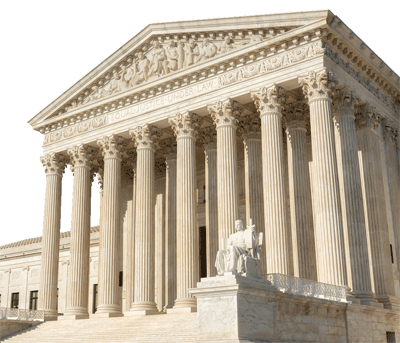|
IMPORTANT RULING
ON CENSURING DIRECTORS
 An important case was recently decided by the U.S. Supreme Court which gives guidance on a board's right to publicly censure a director. An important case was recently decided by the U.S. Supreme Court which gives guidance on a board's right to publicly censure a director.
Public Censure. The case involved David Wilson who was on the board of directors of the Houston Community College System (CSS). Wilson had a history of criticizing fellow directors and filing lawsuits against CSS that cost the organization more than $270,000 in legal fees. The board had enough and publicly censured Wilson in an open meeting for his behavior.
Board Sued for Mental Anguish. In keeping with his propensity for filing lawsuits, Wilson sued CSS and fellow directors for mental anguish and punitive damages, claiming the censure was an unconstitutional retaliation for his free speech criticism of the board.
Censure is Also Free Speech. In a 2022 unanimous decision, the U.S. Supreme Court ruled that Wilson did not have a valid claim. The Court reasoned that the censure was itself a form of speech by elected representatives concerning the public conduct of another elected representative. The censure did not prevent Wilson from doing his job, nor deny him any privilege of office. To read the case, see Houston Community College System v. Wilson.
Removal From Office. In addition to censure for bad behavior, boards can remove an errant director as an officer, i.e., president, vice-president, secretary, or treasurer. Since officers are appointed by and serve at the pleasure of the board, they can be removed from office by fellow directors at any time for any reason. Removal does not require a noticed hearing since it is not a disciplinary action involving penalties or loss of privileges--the director retains the right to attend meetings and vote on issues. The action can be done by motion at a board meeting. (For more information, see Changing Officers.)
RECOMMENDATION. As a reminder to our clients, we provide board orientations with guidance on a director's duties and how boards can avoid potential litigation and liability. We provide these at no cost to our CAP clients. For more information on the program and adoption of an ethics policy, send us an email.
SOLAR PANELS ON
CONDO ROOFS
QUESTION: Even though our roof is owned by the association, management is telling the board they have to allow owners to install solar panels on our roof. Doesn't this create liability for roof repairs and replacement? Wouldn't it be better for the board to install solar panels for common area usage? –Bryan W. Even though our roof is owned by the association, management is telling the board they have to allow owners to install solar panels on our roof. Doesn't this create liability for roof repairs and replacement? Wouldn't it be better for the board to install solar panels for common area usage? –Bryan W.
ANSWER: Your manager is correct; associations cannot prohibit the installation of solar panels on the roof of the building in which the owner resides. (Civ. Code § 714.1(b).) If an owner wants to install solar panels on the association's roof, he/she must submit a request to the association along with plans, and notify each owner in the building of their intent to install a solar energy system on the association's roof. (Civ. Code § 4746(a).)
Record a Covenant. Boards should require owners sign and record a covenant that addresses problems related to their duty to carry insurance, be liable for leaks and roof damage, indemnify the association, maintain their solar panels, and remove and replace them when it's time for the association to replace the roof. The covenant should also include the association's right to remove the equipment at the owner's expense if he/she refuses to abide by the covenant. (Civ. Code §§ 714.1 and 4746.)
Equitable Allocation. The challenge for an applicant is the equitable allocation of roof space. If there are 20 condominium units under one roof, each owner will have the right to 1/20th of the available roof space, which is very little. If the roof has HVAC units and other equipment on the roof, the usable space is reduced even further. As provided by statute, an association can require the applicant submit a solar site survey prepared by a licensed contractor showing an equitable allocation of the usable solar roof area among all owners sharing the same roof. (Civ. Code § 4746(b).)
RECOMMENDATIONS: (#1) Boards should prepare a solar policy so owners will know what they can and cannot do when it comes to installing solar panels on common area roofs. (#2) Legal counsel should prepare and record agreements when owners install solar panels on common area roofs. (#3) Boards should consider using common area roofs for solar systems that benefit the membership as a whole. Doing so would not only reduce electrical expenses, it could avoid problems with owner installations since there may be little or no roof space left for individual owners. If boards need assistance preparing guidelines and solar covenants, contact us for further information.

Dues Increases. Adrian, regarding the 20% increase without membership approval, as a member of the Davis-Stirling Committee that drafted the Act, I remember discussions about this important provision. Many governing documents at that time limited dues increases to as low as 3%; hardly in keeping with inflation. A lot of associations thus had difficulty providing necessary services. Unit owners in those days were naive about their operations and corresponding costs. Obtaining membership approval for a dues increase was consequently met with much resistance. In my opinion, this provision in the Davis-Stirling Act may have been the most important one we adopted. -Mike Packard
Petty Cash #1. Our 225-unit condo still maintains a $400 petty cash fund in addition to a debit card account. Personally, I would prefer to use prepaid debit cards which are only replenished upon successful reconciliation. –S.F. Our 225-unit condo still maintains a $400 petty cash fund in addition to a debit card account. Personally, I would prefer to use prepaid debit cards which are only replenished upon successful reconciliation. –S.F.
Petty Cash #2. If the association gets a no-fee credit card with a cash rebate, it can save money by paying expenses such as insurance bills, utilities, etc. We pay our main insurance policy monthly. Since it is about $100k per year, we could save $1,500 per year with a 1.5% rebate, which I have found a card that provides. –Michael S.
Petty Cash #3. Most of our HOAs with onsite managers have a petty cash bank account tied to a debit card. The manager submits copies of the invoices and we transfer that amount back into the petty cash account. It is invaluable for online purchases, emergency vendors who insist on being paid up-front, and trips to the store, for instance for food for a meeting, where the exact amount isn’t known beforehand and it can’t wait for a check issued through the normal check-writing process. Also, credit cards are problematic as most companies require a person to sign as guarantor for any charges, and directors (rightly) are hesitant to do so. –Sue D.
Petty Cash #4. We don't have a petty cash fund. Instead, we ask our members that want to make a small purchase for our HOA to get verbal approval from our treasurer or the chair of the committee that deals with the issue, and then email a copy of the receipt to our bookkeeper. He then checks with the responsible board member to confirm this was OK and sends a check to the homeowner. -Peter A.
Petty Cash #5. We have a petty cash fund for small purchases and reimbursements. It was used 2x in the past 2 weeks for small items. –Emily
Petty Cash #6. I think a debit card linked to a special bank account with a limited value is the right way to go. Reimbursement to that account would be by receipts or other evidence of the expense being valid and required in a timely manner. Receipts could then be properly coded to the proper GL account. Expenses could be reviewed at a board meeting and inappropriate use can be identified and controlled. Authority for card issue would be noted in the minutes, the same as opening a bank account. This does require time that should be accounted for in the cost of a management contract (the reason my supervisor at the management company was uneasy with the recommendation). Tracking who has such cards can also be time-consuming. –Steve S.
Petty Cash #7. We reinstated our petty cash system after trying to work with a debit card and direct reimbursement payments from our management company. It is the fastest way to reimburse residents up to $500 for authorized expenditures. We are a small 112 home HOA and we have a top notch treasurer. -JoAnne S.
Petty Cash #8. Our board has a small petty cash fund, but in reality we usually have to charge purchases on our personal cards and get reimbursed. The cash isn’t often used but good to know it’s there. –Jennifer B.
A Puppy. Thanks for these newsletters. As former HOA prez for 10 years (I didn't run again, rescued a puppy, and life's been better ever since), I find them always informative! –Sherry F.
Thank You. Thank you for your newsletters. I am a former HOA board member and these really help with our current board and its duties. Keep up the good work. -James N.

|
DISCLAIMER. Our newsletter provides commentary, not legal advice. Boards need to retain an attorney to review all the facts and give a legal opinion on the issues they face. We serve as corporate counsel to California associations only. Request a proposal to represent your association.
PAST NEWSLETTERS. Readers can find current and prior year newsletters posted here. Older newsletters are not posted since the information they contain can change over time with new statutes and case law. The website, however, is kept updated with current information which can be found via the "Index" or through our website's internal "Google Search" feature. |
|
|